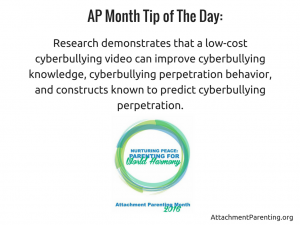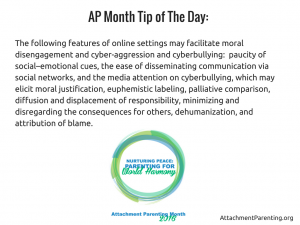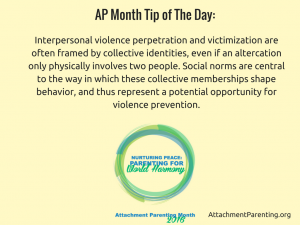 Add your own photo to API’s Community of Peace and “heart” your favorite.
Add your own photo to API’s Community of Peace and “heart” your favorite.
Category: AP Month 2016
One generation full of deeply loving parents
Daily tip: Cyberbullying prevention
Unless we teach our children…
Daily tip: Cyberbullying
API Love
 Add your own photo to API’s Community of Peace and “heart” your favorite.
Add your own photo to API’s Community of Peace and “heart” your favorite.
Daily tip: Social norms shape violent behavior
Modeling empathy to promote peace
 I believe empathy is one of the most important aspects in promoting peace. Children who are taught to be empathetic and who witness empathy will, in turn, show more empathy to others.
I believe empathy is one of the most important aspects in promoting peace. Children who are taught to be empathetic and who witness empathy will, in turn, show more empathy to others.
I attempt to teach empathy to my children through positive discipline, responding sensitively to their needs and emotions, and being present for them. I do my best to create a safe space for their emotions and to be a model of peaceful interactions with others.
Nowadays in my family, modeling empathy often occurs when helping my 4-year-old son wait while his sister has the toy he wants. I empathize with his emotions of frustration while also explaining that she would be sad if he took the toy from her.
When my 2-year-old daughter pouts, “I wasn’t ready to go to bed,” I choose to show her compassion. I acknowledge that she’s sad and say something like, “I know it’s hard to stop playing and go to bed, especially when your brothers are still awake, but now it’s time for us to cuddle together, and I’ll sing to you.”
With my 6-year-old son, we talk about how his strong emotions like anger are OK but that we need to work together to find appropriate outlets for those feelings.
 Being sensitive to my children’s emotions works in helping them have more peaceful interactions with others. When my oldest son was 2, I remember hearing him putting his stuffed animals to sleep, speaking very gently to them and being present with them as I was with him. Now, at age 6, I see him express concerns for others when they get injured. Even my youngest child, only 2, will ask if I’m OK when I get hurt.
Being sensitive to my children’s emotions works in helping them have more peaceful interactions with others. When my oldest son was 2, I remember hearing him putting his stuffed animals to sleep, speaking very gently to them and being present with them as I was with him. Now, at age 6, I see him express concerns for others when they get injured. Even my youngest child, only 2, will ask if I’m OK when I get hurt.
For my children today, opportunities for empathy happen most often in interactions with classmates, neighbors, and each other. But someday when they’re grown, I believe it will translate into their relationships with coworkers, spouses, their own children, and others they encounter in their lives. This is how practicing Attachment Parenting and being sensitive, responsive, and empathetic to our children can help create peace outside of the family and in the greater community.

